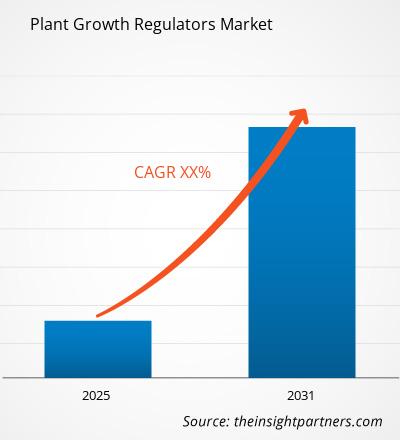Analyst Perspective
The global plant growth regulators market is expected to register a CAGR of ~8%. The market for these regulators is growing due to increased demand for higher agricultural productivity. Farmers use PRGs to manage plant growth, improve crop quality, and increase yield. The market is boosted by their adoption in horticulture, floriculture, and turf management. Factors like population growth, changing diets, and the need for sustainable agriculture contribute to the market's growth, making it a promising sector with the rising demand for food and efficient farming practices. The stringent regulatory framework, limited awareness, and alternative competition are significant factors that may hamper plant regulators' market growth. Growing demand for organic food, Technological advancements, and increasing investments are significant opportunities for the growth of the plant regulators market.
Market Overview
Plant growth regulators, also known as plant hormones, are chemical substances that control various aspects of plant growth. They impact seed germination, root and shoot growth, flowering, and fruit ripening. The overuse of chemical pesticides has led to the development of resistance in many pests and insects. Plant growth regulators can be a more sustainable alternative to pesticides, helping control pests without harming the environment. Biotechnology is being used to develop new plant growth regulators that are more effective and efficient, which is expected to drive the growth of the market for plant growth regulators in the forecasted period.
Market Drivers
- Increasing demand for high-quality crops and agricultural productivity increased demand for plant growth regulators as they help improve crop yields and quality.
- Precision farming uses technology to collect and analyze data about crops and soil conditions, allowing farmers to apply fertilizers, pesticides, and plant growth regulators. This led to increased efficiency and profitability for farmers and reduced environmental impact.
- Consumers are increasingly concerned about the environmental impact of food production. Plant growth regulators can be used to promote sustainable agriculture by reducing the need for chemical fertilizers and pesticides, improving soil health, and conserving water.
Market Segmentation
The global plant growth regulators market is segmented based on type, crop type, function, and mode of application. The plant growth regulators market is segmented based on type into cytokinin, auxins, gibberellins, and ethylene. The plant growth regulators market is segmented based on crop type into cereals and grains, oilseeds and pulses, fruits and vegetables, and turf and ornamentals. The plant growth regulators market is segmented based on function into plant growth promoters and inhibitors. Based on the mode of application, it is segmented into fertigation and foliar.
Regional Analysis
The report provides a detailed industry overview, which includes qualitative and quantitative information. It gives information on an overview and forecast of the global plant growth regulators market-based on several segments. It also provides market size and forecast estimates from 2021 to 2031 concerning five major regions: Europe, North America, Asia-Pacific (APAC), Middle East & Africa (MEA) and South & Central America. The plant growth regulators market by region is also sub-segmented by respective countries and segments. The plant growth regulators market report covers an analysis and forecast of eighteen countries globally and the prevailing trends and opportunities in the region.
The report analyses factors affecting the plant growth regulators market, both the demand and supply side. Furthermore, it evaluates market dynamics during the forecast period, i.e., drivers, challenges, opportunities, and future trends. The report also provides an extensive Porter's Five Forces analysis highlighting factors affecting these regions' plant growth regulators market.
Key Players
The reports cover vital organic and inorganic growth strategy developments in the plant growth regulators market. Various companies concentrate on organic growth strategies such as product launches, approvals, patents, and others. Inorganic growth strategies activities observed in the market were acquisitions, partnerships & collaborations. These activities have paved the way for the development of the business and customer base of market players. The market players in the plant growth regulators market are estimated to have lucrative growth opportunities with the increasing demand for high-quality crops in the global market.
The report includes key companies' profiles, SWOT analysis, and plant growth regulators' market strategies. The report also focuses on leading market players with information including components and services offered, company profiles, financial information for the last three years, and critical development in the past five years.
Below is a list of companies engaged in the plant growth regulators market.
- ADAMA Ltd
- Arysta Lifescience
- BASF SE
- Bayer CropScience
- Rainbow Ecoscience
- FMC Corporation
- Nufarm
- Syngenta
- Valent Bioscience
- Fine Americas
Plant Growth Regulators Report Scope
| Report Attribute | Details |
|---|---|
| Market size in 2024 | US$ XX million |
| Market Size by 2031 | US$ XX Million |
| Global CAGR (2025 - 2031) | XX% |
| Historical Data | 2021-2023 |
| Forecast period | 2025-2031 |
| Segments Covered |
By Type
|
| Regions and Countries Covered | North America
|
| Market leaders and key company profiles |
- Historical Analysis (2 Years), Base Year, Forecast (7 Years) with CAGR
- PEST and SWOT Analysis
- Market Size Value / Volume - Global, Regional, Country
- Industry and Competitive Landscape
- Excel Dataset



Report Coverage
Revenue forecast, Company Analysis, Industry landscape, Growth factors, and Trends

Segment Covered
This text is related
to segments covered.

Regional Scope
North America, Europe, Asia Pacific, Middle East & Africa, South & Central America

Country Scope
This text is related
to country scope.
Trends and growth analysis reports related to Chemicals and Materials : READ MORE..
The List of Companies
1. ADAMA
2. ARYSTA LIFESCIENCE
3. BASF SE
4. BAYER CROPSCIENCE
5. Rainbow Treecare
6. FMC CORPORATION
7. NUFARM
8. SYNGENTA AG
9. Valent BioSciences Corporation
10. Fine Americas, Inc.

 Get Free Sample For
Get Free Sample For